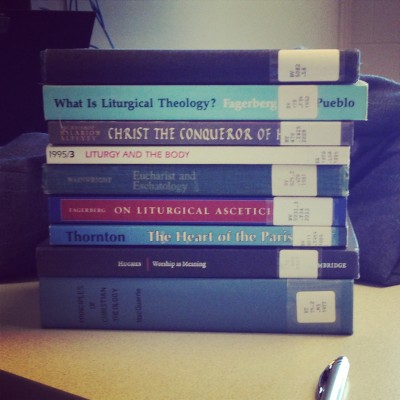If you’re new to my Sermon Notes, you can read about why I prepare them here. The notes aren’t just for preachers; they’re for everyone!
Thesis
The lessons for the Sixth Sunday of Easter really boil down to those two words: love and obedience. Focusing primarily, though not exclusively, on the Collect and the two Johannine texts, the lectionary passages tie together the doing of God’s will/obeying God’s commands with our love for him (and his love for us). To love God is to obey him and to obey God is to love him.
Analysis
Collect
O God, you have prepared for those who love you such good things as surpass our understanding: Pour into our hearts such love towards you, that we, loving you in all things and above all things, may obtain your promises, which exceed all that we can desire; through Jesus Christ our Lord, who lives and reigns with you and the Holy Spirit, one God, for ever and ever. Amen.
Love and desire. Upon reading the Collect I am left with two questions, “What is it that you love more than anything else?” and “What is it that you desire more than anything else?” It may seem as if the answer to each question should be different, but I believe the two should be the same. I have often heard—and perhaps you have too—the claim that if you love God he will give you all the desires of your heart. It’s used to suggest that once we love God we can ask for anything we want in more of a prosperity-gospel type setting, but I think there is something powerful going on here.
If we truly love God with all of our heart, mind, soul and strength then he will be the only true object of our love and desire. To love God is to desire him above all else. So when the Collect says that God’s promises will exceed all of our desires it is really suggesting that God’s promises will exceed all that we desire about him.
Follow me into the knee-deep waters of philosophy once more. James K.A. Smith (and therefore Augustine) will be our guide. Here is what I wrote during Lent:
Our desire is not in a vacuum. All desire has an object. Human desire began in creation and the only object of our desire was God; this is as it should be. However, with sin our desire became misdirected, unaligned, disordered and instead of God we found other objects and things toward which we point our desire.
Desire here is much more than affection it. It is kardias, our gut (or core) love. Through the work and person of Jesus Christ our desires can again be ordered toward God and that is the main sentiment of this collect: taming and ordering our unruly desires. To love God’s commands and to desire his promises is indeed to be a covenant-member of his family, a kingdom citizen of his already inaugurated but not yet consummated kingdom. And it is this coming Kingdom—the new heavens and the new earth—when God shall be all in all—where our true desires should be fixed.
First Lesson – Acts 10:44-48
This passage requires a backstory. One of the lesson options for Easter was Acts 10:36-43 and you may have preached from/with that text, or perhaps not. Either way it has been at least 6 weeks since Acts 10 was part of the lectionary and likely even longer than that if you opted for another text on Easter. Act 10:44-48 is the climax of Peter’s encounter with Cornelius and his household.
Remember, Peter first had the vision of a great white sheet with all types of animals and he was told to eat and kill. God commanded him to consume things that were “unclean” as a way of opening his heart and eyes to the reality that the new Israel was for both Jew and Gentile. Peter then goes to the home of a Roman centurion, Cornelius and preaches the Good News of Jesus. Our passage for Sunday comes at the tail end of that preaching, of Peter’s first intentional ministry among the Gentiles, and the result is conversion.
I have found that Acts 10:44 is an important verse for a theology of preaching: the Holy Spirit falls upon those who hear Peter’s words. It is not Peter who is responsible for conversion or transformation but the Holy Spirit working through human words. You better believe as a preacher that the Spirit needs to descend and be active for your sermon to carry weight or significance; maybe you could try praying at the beginning of your sermon (either privately or publicly) that the Spirit would anoint you and open the ears and hearts of those hearing your words…just a thought!
The Spirit is present and the newly converted are amazed that the Spirit would be given to Gentiles. Friends, there is neither Jew nor Greek in the body of Christ! There is no longer a dividing barrier between “us” and “them” in Christ Jesus! The Spirit goes where he pleases and pours himself out upon whom he desires—we cannot contain him.
Notice the connection here between the Holy Spirit and baptism: the two are intertwined and one cannot be separated from another. A good and healthy view of baptism would suggest that baptism (be it infant or adult) is both a baptism by water and the Spirit.
Peter is obedient to God’s command to preach to the Gentiles and through his obedience a Roman household comes to faith, receives the spirit and is baptized. I think of Jesus’ words in John, “Peter, do you love me? Feed my sheep.” Peter’s obedience to Christ is birthed from his love for his master.
Psalm 98
“Sing to the Lord a new song, for he has done marvelous things!” Immediately your mind should be racing to the great victory songs of Scripture: Moses and Miriam after the Exodus, Hannah’s prayer of thanksgiving after leaving Samuel at the temple, Zechariah’s prophesy once he regained his voice, and Mary’s Magnificat upon learning that she would be the mother of our Lord.
Israel rejoiced after release from Egypt, “I will sing to the Lord, for he has triumphed gloriously” (Exodus 15:1) and Miriam added, “Sing to the Lord, for he has triumphed gloriously” (Exodus 15:21).
Hannah prays, ““My heart exults in the Lord; my strength is exalted in my God. My mouth derides my enemies, because I rejoice in my victory,” (1 Samuel 2:1).
Mary sings, “My soul magnifies the Lord, and my spirit rejoices in God my Savior, for he has looked with favor on the lowliness of his servant,” (Luke 1:47-48).
Zechariah prophesies, “Blessed be the Lord God of Israel, for he has looked favorably on his people and redeemed them,” (Luke 1:68).
The Psalmist is instructing the people: sing to the Lord because he has acted! Sing a new song because he has done great things! Notice that with each highlighted story above and the charge from the Psalmist that the call is to praise God BECAUSE he has done something. God is worthy to be praise at all times and in all places but this specific call to worship is based on His saving acts and deeds.
The joy of Psalm 98 is found in the hope that YHWH is not yet finished in his salvific works. Verse 4 says, “He remembers his mercy and faithfulness to the house of Israel,” though Israel would sing this Psalm while in exile and under foreign rule there was still hope because YHWH had revealed himself as faithful and had promised freedom to his people.
We proclaim the same hope in our Eucharistic prayers: “Christ has died. Christ is risen. Christ will come again.” Or even, “We remember his death, we proclaim his resurrection, we await his coming in glory.” Our Christian hope is based on that which has already taken place—we cannot have hope without remembrance as the foundation and we cannot remember without seeing hope born in our hearts as a result.
Epistle – 1 John 5:1-6
For five chapters John has talked about sin, light, darkness and love and now we arrive at the most concrete statement describing such love. “For the love of God is this, that we obey his commandments.” This may be the capstone of John’s argument in his first epistle: to love God is to obey him. We love because he first loved us—our loving response is nothing short of obedience, submission, and reverence.
Notice what John does in the last line of this passage: the combination of water and blood. John records this in his gospel, “Instead, one of the soldiers pierced his side with a spear, and at once blood and water came out,” (John 19:34). The water and blood comment in 1 John must certainly be a reference to his own gospel account. Jesus’ baptism wasn’t simply by water when John baptized him in the Jordan, he was also “baptized” by his death which is why baptismal imagery suggests that when one goes under the water he/she dies with Christ and when one emerges from the water he/she is rising with Christ. One cannot truly understand the sacrament and call of baptism without seeing the road of discipleship leads to the cross.
Christ the conqueror of all things, he is Christus Victor, and by his death he has trampled down death. Our faith in him, in his resurrection, is therefore able to conquer all. We do not conquer, but in Christ we are more than conquerors. It’s a small shift but it’s an important one. Faith is born in us by the Spirit and is made perfect in Christ; Christ is the conqueror of all and invites us to be conquerors with him, through his work.
The hinge upon which John’s epistle—indeed, his view of discipleship—hinges is loving obedience.
Gospel – John 15:9-17
We again encounter John’s combination of love and obedience. Jesus shows his disciples how to love and to obey based on his relationship with the Father. Because the Father has loved him so he loves us and we are therefore called to respond with love; because he has obeyed the Father we are invited to obey him through loving action. My comments from last week can be found here and are still applicable to this week’s lessons. To abide is to love and obey.
Jesus predicts his death in saying, “No one has greater love than this, to lay down one’s life for one’s friends.” He has already suggested in John 10 (read two weeks ago) that he has the power to lay down his life and pick it up again. He has already mentioned earlier in John’s gospel that he will destroy the temple and raise it up in 3 days. Finally, he has already shared a meal and foot-washing with his disciples and claimed that he would be betrayed. There should be no surprise by John 15—for the disciples or the reader—that this story is moving toward the point of no return.
Why shouldn’t it be a surprise for the disciples?
Because Jesus is inviting them to participate in the drama of salvation as friends rather than servants.
Because Jesus has shared his life and ministry with this group of followers.
Because Jesus is calling his disciples to become apostles and carry on his ministry.
The reference to “This is my commandment, that you love one another as I have loved you” and “I am giving you these commands so that you may love one another,” point directly back to John 13 and the washing of the disciples’ feet. You cannot separate John 13 from John 15—they are not only part and parcel of the same concept, they take place on the same evening in the same discourse!
One bit of humbling reality: Jesus’ chooses us; we do not choose him. Now, in Christ the way to salvation has been opened up to all people, but it is still Jesus who moves first. The call to discipleship, as I’ve said before, is simple: Jesus calls and we follow. We do not need to go out and find a master, rabbi, mentor or pastor; we do not need to go and find the Shepherd. We are the sheep of his pasture and he has called out to us already, the question is now this: do we hear his voice and will we answer him? That’s the true call to discipleship.
Liturgical Considerations
The Psalm is quite clear that we are to SING and make a joyful noise to the Lord. Here is something I’d like you to consider: consider working with your music and/or liturgy minister to pen a song or prayer recounting the mighty acts of God in the life of your own church. This is a type of lyrical/musical/liturgical Ebenezer, a remembrance stone based on the many ways God has acted in, through, and amongst your flock. Perhaps you had a building campaign, or a tragedy in your congregation, or an important leadership transition or anything else significant and now is the time to praise him about it.
You could incorporate this piece into your opening worship or the prayers of the people or even as a responsive reading as part of your sermon. The important point here is that your church has the opportunity to corporately and concretely give thanks and praise for God’s saving deeds. Use the songs of Moses, Hannah, Mary and Zechariah as a launching pad into your own celebration.
Synthesis
The second half of Eastertide has shifted from encounters with the Risen Lord to Jesus’ words and teachings prior to his death. This shift can and should be seen as an exploration of Jesus’ call to his followers about what it means to be a disciple and ultimately what it means to be the church, the pilgrim people of God. Shifting from a week in John 10 to two weeks in John 15, Eastertide culminates in Jesus’ highly priestly prayer recorded in John 17. Jesus prays that we all may be one and the following week we celebrate Pentecost and the birth of the church.
This progression is not a coincidence! To encounter the Risen Lord is to be called further into discipleship; as we spend a second week in John 15 may we remember that we love and obey him because he has revealed himself as faithful and loving through the crucifixion and resurrection.
To love God is to obey his commands. His new commandment (John 13) is to love one another. The great commandment is to love God with all our heart, soul, mind and strength. In Jesus our desires and love are re-directed, re-aimed at God and we can find our heart’s truest desires and more when we love him because he is the object and subject of our love! Love is not passive, it is active and it is obedient.
Have you heard the call?
Have you responded?
Will you love and obey?
This is what it means to be a disciple…this is what it means to be the church.
















